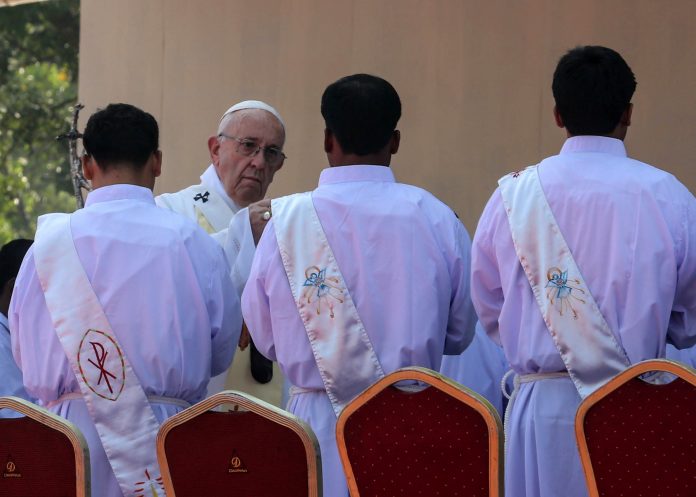The Catholic Church has designated December 26 as the commemoration of the martyrdom of St. Stephen, the so-called first martyr of Christianity.
Those who rejected Christianity were angered by the wisdom and eloquence of Stephen who courageously defended the teachings of Christ. He was accused of blasphemy, but he stood by his faith even if he had to pay for it with his own blood.
What is the significance of celebrating Stephen’s martyrdom during the octave of Christmas? The closest reason is to honor someone who dedicated his life to the teachings one whose birth was recently celebrated.
Stephen is also one of the first deacons of the Church. Not everyone, even those who profess the Catholic faith, knows what a deacon is.
Vatican II restored the ministry of a permanent diaconate, but in his apostolic letter, “Sacrum Diaconatus Ordinem,” Pope Paul VI left it to “the legitimate assemblies of bishops of episcopal conferences to discuss, with the consent of the Supreme Pontiff whether and where … the diaconate is to be instituted as a proper and permanent rank of the hierarchy.”
Permanent deacons are either married or celibates. Married men may be ordained as deacons on the ground that once their spouse passes away, they will stay single.
In 2008, a Filipino was ordained deacon in the United States for the Archdiocese of Washington. Deacon Leandro Yambao Espinosa, who was born in San Isidro, Nueva Ecija, received the ministry from Archbishop Donald W. Wuerl of Washington.
Before going to America, Deacon Espinosa worked as a teacher in Ateneo and as an agricultural economist for the Development Bank of the Philippines. He is married to Maria Lourdes Abella and has four children.
In the Philippines, there are no permanent deacons. Its institution was raised during the second Plenary Council of the Philippines but it did not receive the necessary support of the bishops.
Back in 2014, I was in Culion, Palawan, to help in a rehabilitation program for victims of super typhoon Haiyan. The location of the communities made it difficult for residents of one island to attend religious services on another island.
Every Sunday, the parish sends lay ministers to the remote islands for the Liturgy of the Word and the Holy Communion.
In urban areas, deacons can assist priests in administering other sacraments, such as baptisms and weddings, lead social ministries and visit the sick. It can give priests time for other administrative parish works, among others.
Those who oppose the institution of permanent deacons in the country maintain that it is not necessary because the Philippines has plenty of priests. Some say the Church does not have enough funds to provide for deacons, while others say that it can lead to the “clericalization” of the laity.
There could be no shortage of priests in the Philippines, but the number is not enough to serve the community. Priests also get “burned out.” In the first place, the institution of a permanent diaconate was not created to solve the scarcity of priests. It is itself a distinct vocation.
And even without deacons, there are lay persons who “act like clerics.”
As to confusion among the faithful, what is needed is the education of the faithful. Many “Sunday Catholics” even don’t known about the growing number of “secular institutes.”
Finally, some argue that the Church does not have enough funds to support deacons, but on the contrary, permanent deacons may not require financial support because, like in other countries, the can have “secular jobs.”
The process of becoming a deacon requires intense formation, and candidates must not only be mentally but financially equipped to support themselves and their families.
We can’t think of a parish without lay men and women who serve the community. Servers are all volunteers but still they patiently render their talent and time without getting compensated.
We are entering a new era. The Philippine Church will celebrate the 500th year since Christianity reached our shores. If there will be proposals for change, may the ministry of permanent deacons be considered.
Adrian Banguis-Tambuyat is a young communication practitioner specializing in online content strategy and broadcast journalism. His interests are focused on social justice, youth formation, communication theology and mass media evangelization.









